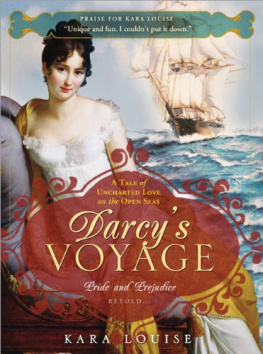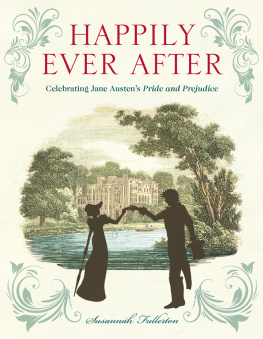Chapter 5
The following day, Elizabeth rose at the first signs of dawn and quickly made her way aloft, beckoned by the promise of sunshine and fresh air.
She politely nodded to the crew she passed as they hurriedly set out to ready the ship for another full day of sailing and she determinedly set out to walk. She stepped briskly, holding her shawl tightly around her shoulders as the morning air was cool, and the breeze from the sea, coupled with the movement from the ship, made it cooler than it really was.
At length, just as she began her second time around the deck, she noticed Mr. Darcy step out. He looked her way, and she was surprised to see that he refrained from walking until she reached him.
Good morning, Miss Bennet.
She nodded and replied, Good morning, Mr. Darcy.
He joined her in her stride, walking with his hands clasped behind him, looking either straight ahead or out across the sea. Elizabeth sensed that he was far away and was perfectly satisfied with the silence between them. She felt an awkwardness that stemmed from her uncertainty concerning whether, if he had his preference, he would wish to walk unaccompanied.
She occasionally slowed or quickened her gait to see if he would pass on ahead of her, but each time he adjusted his steps accordingly. She finally settled in her mind that he was content to walk in this markedly silent manner, which was broken only occasionally by one or the other in a comment about the weather, the sea, or how other passengers were faring.
Elizabeth stole some glances at him and marvelled that while walking, his stern demeanour seemed to soften somewhat. He seemed at peace, almost at home, in this activity. They continued to walk briskly and talk little, but when they did, he offered very little information about himself and she did not pry.
As more and more passengers came up, it became increasingly difficult to walk in a leisurely, unobstructed fashion. Elizabeth commented that she should get back down to steerage to see how the others were faring.
Darcy seemed inclined to say something as he took in a deep breath. Fully expecting him to speak, Elizabeth waited, but when he did not, she turned to leave.
In an action that surprised her because she did not expect it from him, nor did she expect the stirring feelings it provoked in her, he reached out and stopped her by slipping his hand through her arm.
Miss Bennet, will you be walking again tomorrow morning?
Elizabeth pondered whether his question was to ascertain if he would finally have the pleasure of a walk in solitude, or, however unlikely in her opinion, he looked forward to a walk together again. Her rapidly beating heart made it terribly difficult to think, let alone be rational and reasonable.
I love to walk in the early morning hours, Mr. Darcy. It is one of my favourite pastimes at home, and as the exercise and fresh air are all I need to keep up my strength and endurance on the ship, then I imagine I will.
He merely nodded, letting go of her arm, almost reluctantly. She did not believe that he could truly enjoy having her as a walking companion. They had not engaged in any kind of lively discussion or divulged any personal information. But, when she left and as she made her way down to steerage, she wondered whether his question reflected a desirable anticipation.
Elizabeth laughed and shook her head. No! How absurd! She was one of those very women who were intolerably beneath him , as he had so adamantly informed the captain!
Elizabeth spent that day helping Mrs. Rawlings and her daughters, as well as a few others who had taken ill. She was grateful that she felt well enough to come up for a break for some intermittent fresh air and sunshine. She found herself in a routine acquiring food and drink, applying cool cloths to fevered foreheads, and simply sitting with, talking with, and encouraging those who were not doing well.
***
It continued in this manner for several days. If Elizabeth came up first for her walk, Darcy joined her when he made his way aloft. If he was up first, when he noticed her he either quickened or slowed his pace until she was by his side.
He never said a great deal, nor did she give herself the trouble of talking or questioning much, but she was struck with the fact that he did ask some questions occasionally that bordered between civility and genuine interest. In addition, he continued to be peculiarly concerned with not only the sleeping arrangements but also the living conditions down below.
In the course of those few days, they shared very little about themselves save that Elizabeth was heading to America to visit her aunt and uncle who were there on business. She hoped to remain over there for a couple of months before returning to England with them.
Darcy, in turn, talked to her of his sister and how he was making the voyage simply to secure her return to England. He told Elizabeth how her governess, who had taken Georgiana to the States with her, had become too ill to accompany her home.
Elizabeth did find, on about the fourth day of their walks, that Darcy was an avid conversationalist when it came to discussing books. She had noticed him reading in the dining area the night before, still keeping to himself, and a simple inquiry about what he was reading seemed to capture his interest.
That began a very diverse, animated, and enjoyable conversation between the two. Elizabeth loved to read, and although she enjoyed indulging in some of the current romance novels of her day, she also read books of more substance, plays and prose by Shakespeare, interesting biographies, and had even ploughed through some historical books with great enjoyment.
Elizabeth looked at each successive day after that as a challenge to discover a subject that interested him and get him involved in a healthy discourse. She loved to question his opinions and disagree with him. She thought it odd that he seemed to enjoy it when she expressed an opposing view.
When they first began discussing books, Darcy assumed Elizabeths knowledge would be limited. He was pleasantly surprised to discover otherwise, but what intrigued him most was the fact that she did not pander to his opinions. She expressed her views without hesitation, albeit politely, and did not try to align them with his solely because he was a man of wealth and connections.
A few days later, Elizabeth began to feel the effects of not sleeping well for several successive nights, but she still eagerly looked forward to her walk. As she readied herself to go aloft, she determined that on this day they would discuss poetry. She wondered whether he enjoyed that literary genre. She imagined he would not.
Later, after they had walked the perimeter of the ship a couple of times, she finally inquired, What do you think of poetry, Mr. Darcy? Is it the food or foolishness of love?
I believe it is said that poetry is the food of love, answered Darcy, fairly suspicious that she was ready to challenge his statement.
So they say. But how often has poetry actually driven away love? If it is a good, strong, healthy love, then anything will nurture it and cause it to grow. But a weak love I am afraid that one good sonnet will starve it entirely away.
But would it not also have to do with the sonnet itself? A good, strong, healthy sonnet should have a positive effect on even the weakest love, whereas a weak sonnet, in even the most fervent and ardent love, might it not even be injurious to it?
Elizabeth smiled. But would not the recipients knowledge and appreciation of sonnets be essential? What is pleasing to one person may not be to another.












